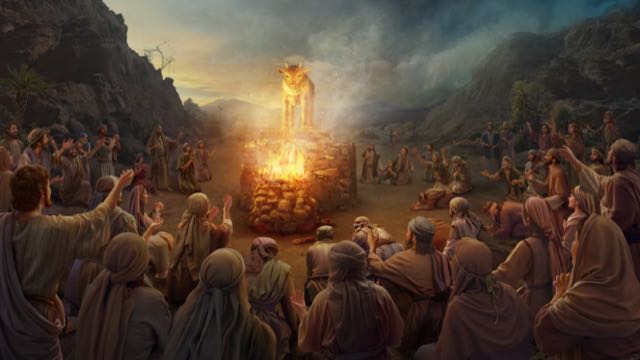Why Did Job Curse the Day of His Birth
At dusk, a grizzled old man was sitting among the ashes. His bare skin was covered with sore boils and these boils were festering and oozing pus, which was too horrifying.
Seen from the look on his face, the old man was extremely grieved but he was very silent. He picked up a potsherd on the ground to scrape the sore boils.
After a while, he opened his mouth to say: “Let the day perish wherein I was born, and the night in which it was said, There is a man child conceived” (Job 3:3).
“Cut!”
After saying this, the director Bochu ran out in a hurry from behind the camera. Frowning, he anxiously looked at the old man and sighed and silently headed back to the monitor.
Seeing his expression, Yi Qian took the white wig off and said helplessly: “Director, don’t be anxious. Let’s think.”
“Let’s call it a day and go rest.”
Two months ago, the church prepared to shoot a documentary Back to the Book of Job. During the screen test, Brother Yi Qian, who was only 35 years old, with his natural and true virtuosity, successfully recreated Job’s grief of scraping his body among ashes. The camera crew, Bochu included, were full of praise for him. Thus, that day, he became the much-anticipated leading role.
His performances these days really didn’t disappoint anyone.
But since they started to film the scene of Job’s curse of the day of his birth, the filming had been stuck.
At night, Yi Qian went back to the break room. Thinking that because his acting over these two days hit a snag, the entire company had to knock off, he felt guilty. But he didn’t know why he could never act well in this scene.
Then he once again opened the Bible and read, “After this opened Job his mouth, and cursed his day. And Job spoke, and said, Let the day perish wherein I was born, and the night in which it was said, There is a man child conceived” (Job 3:1–3). Yi Qian was troubled and then was bent over his desk thinking: “When Job lost his possessions, children, and livestock all over the mountains and even when his body was covered with boils, he didn’t complain about God with his lips but bowed down to the ground and praised God’s name. His faith in God is always the example that Christians followed throughout the ages and God called him a perfect man. How could he, such a perfect man, not know when a man is born is decreed by God? But why did he curse the day of his birth? Is this really a complaint of Job in painful trials?” Yi Qian was a bit puzzled.
As hours passed, it was deep in the night.
Yi Qian did a search with the words “why Job cursed the day of his birth” on the Internet. He clicked on the link of a gospel website and then saw these words: “When Satan stretched forth its hand to afflict the bones of Job, Job fell into its clutches, without the means to escape or the strength to resist. His body and soul suffered enormous pain, and this pain made him deeply aware of the insignificance, frailty, and powerlessness of man living in the flesh. At the same time, he also gained a profound appreciation and understanding of why God is of a mind to care for and look after mankind. In Satan’s clutches, Job realized that man, who is of flesh and blood, is actually so powerless and weak. When he fell to his knees and prayed to God, he felt as if God was covering His face and hiding, for God had completely placed him in the hands of Satan. At the same time, God also wept for him, and, moreover, was aggrieved for him; God was pained by his pain, and hurt by his hurt…. Job felt God’s pain, as well as how unbearable it was for God…. Job did not want to bring any more grief upon God, nor did he want God to weep for him, much less did he want to see God pained by him. At this moment, Job wanted only to divest himself of his flesh, to no longer endure the pain brought upon him by this flesh, for this would stop God being tormented by his pain—yet he could not, and he had to tolerate not only the pain of the flesh, but also the torment of not wishing to make God anxious. These two pains—one from the flesh, and one from the spirit—brought heart-rending, gut-wrenching pain upon Job, and made him feel how the limitations of man who is of flesh and blood can make one feel frustrated and helpless. Under these circumstances, his yearning for God grew fiercer, and his loathing of Satan became more intense. At this time, Job would have preferred to have never been born into the world of man, would rather that he did not exist, than see God cry tears or feel pain for his sake. He began to deeply loathe his flesh, to be sick and tired of himself, of the day of his birth, and even of all that which was connected to him. He did not wish there to be any more mention of his day of birth or anything to do with it, and so he opened his mouth and cursed the day of his birth: ‘Let the day perish wherein I was born, and the night in which it was said, There is a man child conceived. Let that day be darkness; let not God regard it from above, neither let the light shine on it’ (Job 3:3–4). Job’s words bear his loathing for himself, ‘Let the day perish wherein I was born, and the night in which it was said, There is a man child conceived,’ as well as the blame he felt toward himself and his sense of indebtedness for having caused pain to God, ‘Let that day be darkness; let not God regard it from above, neither let the light shine on it.’ These two passages are the ultimate expression of how Job felt then, and fully demonstrate his perfection and uprightness to all. At the same time, just as Job had wished, his faith and obedience to God, as well as his fear of God, were truly elevated. Of course, this elevation is precisely the effect that God had expected” (“God’s Work, God’s Disposition, and God Himself II”).
After he read the passage above, his eyes were moist. He had speculated many times about why Job cursed the day of his birth and had suspicions about Job’s faith in God, thinking that in the trials, Job was weak so he complained to God. He never thought Job’s cursing of the day of his birth could confirm his faith and obedience to God. Through reading these words, his puzzled mind was completely unraveled. He truly acknowledged that God observes the deepest parts of people’s hearts and that Job was truly worthy of being called “a perfect man.”
Then, Yi Qian hurried to Bochu and shared these words with him.
“Thank the Lord. After reading this passage, I finally understand why Job cursed the day of his birth. It turns out that in such a painful environment, he felt God covered His face for God was concerned and aggrieved for him and could not bear seeing him suffer this pain. Because of his perfection and uprightness and moreover, because of his faith and obedience to God, he would rather endure suffering by himself than see God feel grieved and pain for his sake. Thus he wanted to overcome the weakness of the flesh. However, he could not transcend the bondage of the flesh. Because of this, he detested himself. Under the torment of physical and mental pain, Job cursed the day of his birth, for he thought if he hadn’t come to the world, God wouldn’t have been aggrieved by his pain. This is the true reason of Job doing this. Though I long to be a person like Job, I was always puzzled about why Job, so perfect and upright, cursed the day of his birth. Today, only after reading these words do I realize that the behaviors that Job lived out in such extreme pain totally prove that his humanity is indeed better than all of ours.” At this point, Yi Qian choked up.
Then Yi Qian bared his heart to Bochu, “I think of when I had a serious illness last year. I knew regardless of whether it is good or bad, everything contains God’s good intentions. But when my body suffered the torment of illness, though I didn’t say words of complaint about God, I was thinking about why God didn’t protect me. What I revealed in the trial was just my misunderstandings and complaints toward God. Contrarily, when Job’s flesh was painful and weak, he would rather curse the day of his birth than see God be aggrieved by his pain. From this, I see Job had true knowledge of God in his experiences. He knew God’s essence is love and God is the source of all positive things. And he realized that God had no intention to harm man or let man suffer pain and all of man’s sufferings were from Satan. Thus, when he suffered torment, he could feel the sadness and pain in God’s heart—God’s grieving and weeping for him, and he hated Satan in his very bones. Encountering this trial, he not only didn’t complain about God, but had a deeper understanding of God’s genuineness and loveliness. These are all manifestations of Job’s fear of God and shunning of evil.
“Thinking of our misunderstandings about Job in the past, I am very ashamed. Previously, we always thought Job, this perfect man, was flawed. This is not merely our misunderstandings of Job, but our notions about God and the expression that we don’t believe God’s words. The Bible said, ‘For Jehovah sees not as man sees; for man looks on the outward appearance, but Jehovah looks on the heart’ (1 Samuel 16:7). We only look at the exterior of things and judge them according to what we have seen. But God observes the deepest parts of people’s hearts and He can see clearly who truly believes in Him and who is absolutely faithful to Him.”
Bochu said very definitely, “Right. God has a thorough understanding of us mankind. However, we didn’t seek out God’s will in this matter. Only relying on our own conceptions and imaginings, we suspected that Job’s curse of the day of his birth is his complaints about God, and we even couldn’t completely accept that God praised Job as a perfect man. It can be seen that if we do not know God, we will easily develop notions about His words and work. In the future, we can no longer rely on our notions and imaginations to view God’s words and work and neither can we portray Job according to our own thoughts.”
“Absolutely! Thank the Lord so much for letting us see these words today. Job’s testimony moves us and is worthy of our imitation.” Yi Qian said briskly.
Bochu continued, “That’s all right. Filming this movie has so much value. By this, our mistaken views of Job are resolved and moreover, we have more understanding and knowledge of God’s intentions and disposition. When we have true knowledge of God’s intentions and disposition, we won’t complain about and resist the people, things and events God orchestrates for us, nor judge the matters we cannot see through or define people, much less disobey and oppose God. At that time, we can seek out God’s will in everything and fear and obey Him in our hearts.”
The next morning, the continuity man said, “Back to the Book of Job, Scene 20, take 10. Action!”
With a clap, the old man that was covered with boils started to scrape his body in the ashes.
After a while, he slowly raised his head. Tears seemed to well up in his eyes. At that moment, attachment, adoration, grief—various complex feelings burst out from his eyes.
Then, he sat on the ground. He tried to be strong enough to overcome the flesh. Such a strong wish shocked everyone.
At last, he extremely loathed himself, shouting with grief: “Let the day perish wherein I was born, and the night in which it was said, There is a man child conceived” (Job 3:3).
The director, in front of the monitor, gave a satisfied smile.
“Pass!” He shouted.
The crew was so excited that they felt like jumping for joy and the applause broke forth.
Yi Qian rose up, and shed tears of joy.
- 1Why Is It Hard for a Rich Man to Enter God’s Kingdom?
- 2What Is the Meaning of the Parable of the New Cloth and Old Garment?
- 3What Do the Overcomers in the Bible Refer To?
- 4What Does John 3:36 Mean?
- 5What Is the Church of Philadelphia in the Bible?
- 6Are You Really Worshiping the Lord Jesus at Christmas?








